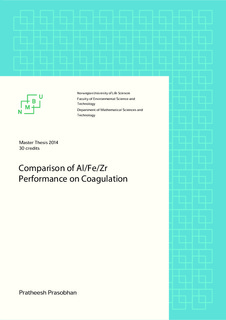Comparison of Al,Fe,Zr Performance on Coagulation
Master thesis
Permanent lenke
http://hdl.handle.net/11250/221183Utgivelsesdato
2014-09-23Metadata
Vis full innførselSamlinger
- Master's theses (RealTek) [1722]
Sammendrag
This work addresses an investigation on and comparison of the coagulation performances of aluminium, iron and zirconium coagulants on real wastewater collected in Norway. This work was carried out from January 2014 to May 2014. Coagulation is an essential part of drinking water treatment as well as wastewater treatment. Aluminium and iron coagulants have been in use for many years as part of wastewater treatment. In recent years however, research has been focused on other new coagulants such as zirconium coagulants. This is because regulatory requirements for wastewater treatment are going to become stricter in the future throughout the world. At the same time, wastewater is becoming more difficult to treat due to the presence of new manmade compounds. Thus the continued use of traditional aluminium and iron coagulants may not be able to meet the stricter standards required.
This thesis presents an overview of the coagulation performances of aluminium, iron and zirconium coagulants on various ratios of mixed greywater and blackwater collected from the wastewater collection point at the Norwegian University of Life Sciences in Norway. Analysis and comparison was done using jar tests with two initial wastewater pH values of 6.0 and 7.5. The removal efficiencies of removing orthophosphates, total suspended solids and turbidity were analysed and compared. It was found that zirconium coagulants had the best treatment efficiencies and the least dosages in all types of wastewaters analysed. The overall implications of the results obtained in this study on the future use of new coagulants such as zirconium coagulants are presented and discussed.
